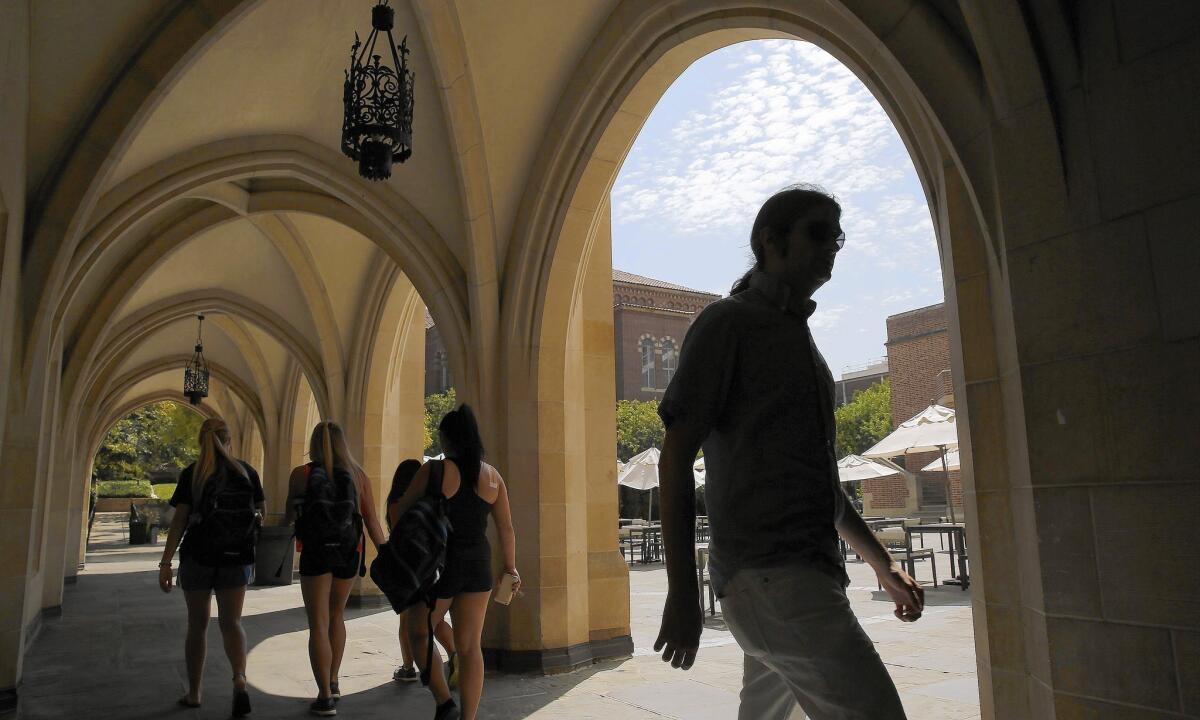California’s four-year universities reach out to immigrant students with low-interest DREAM loans

- Share via
Officials at California’s four-year public universities are reaching out to an estimated 10,000 undergraduate students who might qualify for a special loan aimed at reducing their tuition — a program that further distinguishes the state as a national trendsetter in providing services to immigrants who are in the country illegally.
The California DREAM low-interest loans are designated for such immigrants who are enrolled at University of California or California State University campuses. Gov. Jerry Brown signed the program into law in 2014, but funding didn’t become available until last month.
It’s the latest in a series of measures that Brown and the Democratic-controlled Legislature have approved to help integrate these immigrants into mainstream society.
They have already enacted laws that allowed these people to obtain California driver’s licenses, removed the word “alien” from the state labor code and made it easier for immigrants who are not here legally to get medical care for their children.
Critics say these measures encourage more illegal immigration, hurt taxpayers and reward individuals who have violated U.S. laws.
Read the latest Essential California newsletter >>
The California DREAM loan program’s initial allotment totals $7 million — $5 million for the nine UC campuses with undergraduate students and $2 million for the 23 Cal State schools. The state provided half of the funding and the two university systems covered the rest.
Each student can borrow up to $4,000 for this academic year at an interest rate of 4.29%. Once they graduate, borrowers have a six-month grace period before they must begin repaying their loans.
The loans are for the 2015-16 academic year, and they’re retroactive to last fall. Funds will be distributed to eligible applicants in the coming weeks.
Future funding is contingent on money being available from the state budget, according to school administrators.
Supporters of the program said it could ease the financial burden for students whose legal status makes them ineligible for federal grants or federally subsidized loans.
“I’m very proud of the fact that California has always led when it comes to providing much-needed resources for our undocumented student population — understanding that they are here, that this is their home and that many of them were brought here not out of their own volition,” said state Sen. Ricardo Lara (D-Bell Gardens), who sponsored the bill that created the program.
Opponents say it wrongfully rewards people who shouldn’t be in the United States in the first place.
Ira Mehlman, spokesman for the Federation for American Immigration Reform in Washington, said the program’s funds should instead be used to help law-abiding families in financial need.
“There are a lot of people in California who are struggling,” he said. “Their kids want a good education. Even with the availability of federal loans, it doesn’t come close to meeting the needs of these many families.”
Robin Hvidston, executive director of the Claremont group We the People Rising, said it would be better to earmark the taxpayer-funded loans for veterans, or for students who grew up in foster care.
“This is discrimination against U.S. citizens who are not able to partake in the program,” Hvidston said.
California is one of at least 18 states that permit students who are in the country illegally to pay in-state tuition rates, according to an October report by the National Conference of State Legislatures.
In addition, California is one of five states that allow such students to receive state grants for higher education, the group said.
It’s unclear whether any state besides California has a higher-education loan program specifically designed for these students.
Zenén Jaimes Pérez, policy analyst for United We Dream, the country’s largest immigrant youth-led organization, said California has set a national precedent in establishing rights for people living in the country illegally.
“When I travel to other states, a lot of folks are wondering, ‘How do we get to where California is?’” he said.
tatiana.sanchez@sduniontribune.com
Sanchez is a staff writer for the San Diego Union-Tribune.
ALSO
Apple attorney: Unlocking San Bernardino shooter’s iPhone would open ‘Pandora’s box’
Murder, torture, drugs: Cartel kingpin’s wife says that’s not the ‘El Chapo’ she knows
Court’s move to give two nonprofits access to students’ personal data ignites privacy debate
More to Read
Sign up for Essential California
The most important California stories and recommendations in your inbox every morning.
You may occasionally receive promotional content from the Los Angeles Times.






